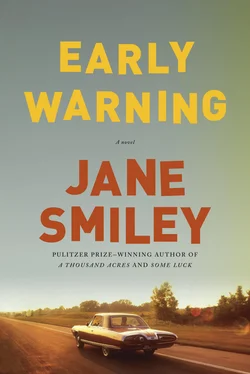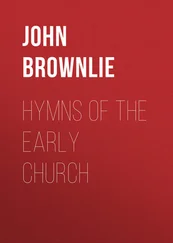Jane Smiley - Early Warning
Здесь есть возможность читать онлайн «Jane Smiley - Early Warning» весь текст электронной книги совершенно бесплатно (целиком полную версию без сокращений). В некоторых случаях можно слушать аудио, скачать через торрент в формате fb2 и присутствует краткое содержание. Год выпуска: 2015, Издательство: Knopf, Жанр: Современная проза, на английском языке. Описание произведения, (предисловие) а так же отзывы посетителей доступны на портале библиотеки ЛибКат.
- Название:Early Warning
- Автор:
- Издательство:Knopf
- Жанр:
- Год:2015
- ISBN:нет данных
- Рейтинг книги:5 / 5. Голосов: 1
-
Избранное:Добавить в избранное
- Отзывы:
-
Ваша оценка:
- 100
- 1
- 2
- 3
- 4
- 5
Early Warning: краткое содержание, описание и аннотация
Предлагаем к чтению аннотацию, описание, краткое содержание или предисловие (зависит от того, что написал сам автор книги «Early Warning»). Если вы не нашли необходимую информацию о книге — напишите в комментариях, мы постараемся отыскать её.
, a national best seller published to rave reviews from coast to coast.
Early Warning — читать онлайн бесплатно полную книгу (весь текст) целиком
Ниже представлен текст книги, разбитый по страницам. Система сохранения места последней прочитанной страницы, позволяет с удобством читать онлайн бесплатно книгу «Early Warning», без необходимости каждый раз заново искать на чём Вы остановились. Поставьте закладку, и сможете в любой момент перейти на страницу, на которой закончили чтение.
Интервал:
Закладка:
Her father got up. Debbie took out her Kleenex and wiped her eyes, of course smearing her mascara. Aunt Andy reached across his empty seat and stroked her arm. Debbie glanced at Uncle Frank, who had gone back to leaning against the wall, and was staring at her father with a kind of hungry curiosity. Yes, they all thought it: How will he survive this?
But her father had pulled himself together, and now he was his usual self. He clasped his hands and said, “I want to tell a little story. Long, long ago, I was driving from Rapid City, South Dakota, to D.C., and when I got to a small town in Iowa, I walked into a bar. Now I say that I walked into a bar, but actually, as I remember, Iowa was dry then, so really, I walked into a drugstore with a soda fountain. And behind the counter there was a very pretty girl. In those days, I, like many of us at the end of the war, considered myself a Big Bad Wolf. Now, thanks to Farley Mowat, we know that the Big Bad Wolf is a wolf who has perhaps lost his female parent, been driven out of the pack at an early age, and may have seen his mate shot by hunters and his single cub die of starvation, but back then, a wolf was a wolf, and if you were a wolf, you had very bad intentions. I chatted up the pretty girl, and I walked her to her car, of course telling her that it was others who had bad intentions, not me. I went to the nearest larger town, and I put myself up for the night.
“The next afternoon, I deployed my very extensive espionage skills to discover that that very same girl showed up to work behind the fountain at noon, and I was at my stool as soon as she put on her apron. I ordered twenty-six cherry Cokes, and have never partaken of a cherry Coke since. I gave her all of my very best Big Bad Wolf speeches, and, sure enough, by the end of the evening, I had her in my clutches. She agreed to accompany me to the wolf den, even though the wolf den was far, far away.
“You know, Little Red Riding Hood always saw herself as the prey of the wolf, but in fact the wolf cared nothing for Little Red — he was after the braised lamb shanks in her bag that she was carrying to her grandmother — and so it was that you should envision that pretty girl, not as Little Red Riding Hood, but as a lamb, frisky and playful, sitting in the front seat of my car. We drove along, and for an hour, the little lamb bleated pleasantly about her job and her family and her brother who had been in the war. I figured that if I drove far enough I could avoid the brother if I had to. I should say that the sun was rather low in the afternoon sky when we departed, and so we stopped for a bite to eat in Cedar Rapids, and then went on. Finally, we got to a town on a big river, and the lamb was getting sleepy, and so I said, ‘Would you like to stop for the night?’ I was licking my wolfish lips, of course.”
Debbie looked around. Everyone was staring at her father, and Debbie thought it was a very good thing most of them knew him quite well. He went on. “Well, I went into the office of a little motel by the river, and I asked for a room, and the old granny there looked at me as if she was afraid she might be eaten, and gave me the key. Then I let the lamb out of the car, and she looked, I must say, just a trifle nervous, so I opened the door of the cottage, gave her the key, and went back to my car. I sat there for a long time, contemplating my wolfish nature. And then I fell asleep. It got very cold, what with the fog rising off the river, and I woke up. I looked around and I was sore afraid. I could not remember where I was, or how I got there, and even my car looked strange to me in the moonlight, because, of course, there was moonlight. And so I opened the door of the car and staggered out. There was a light on in the cottage, and I went to look in the window.”
Now he stared around the room for effect, as he had so often stared around the dinner table when they were children, daring them not to believe that a bird had brought him Tim’s report card and that, furthermore, the bird had been weeping at the sight of Tim’s D’s and F’s. He said, “The blinds were closed, but just then, two fingers separated two of the slats, and right there, staring at me, was that pretty girl. We both laughed, and I knew right where I was and what I was supposed to be doing, and that, whatever sort of wolf I was, this lamb was on to me, I couldn’t keep anything from her.” Everyone laughed, and Debbie thought, That’s what a funeral is for — laughing. “The next morning, we found a judge, right there in Clinton, and he overlooked a few legal niceties because he was a wise man, and to this day I thank him from the bottom of my heart.”
There was silence. Debbie could see that people were, somehow, tempted to clap, but of course they didn’t. Her father stared at the coffin, and stepped toward it. He put his hand on it and patted it gently. Debbie bit her lips. He looked at her and smiled. She sniffed. But he didn’t sit down. Standing there, one hand on the coffin, he pulled a piece of paper out of his pocket, and stared at it for a moment. Debbie could see what it was — a leaf from her mother’s kitchen pad — and maybe, Debbie thought, he was going to do a very Arthurish thing, read her final shopping list. He said, “Early in the summer, after Lillian got her diagnosis, we were talking about this day, and she said that there was something that I had to — well, we had to do — which was to include her aunt Eloise in the memorial service. Some of you may know that Eloise Silber, Lillian’s mother’s sister, died in San Francisco last spring.”
Aunt Eloise had been discovered dead in her bed by the police, who had had to break down the door. They estimated ten days or two weeks. Between Rosa’s road’s being washed out and the roof’s collapsing with all the rain at the co-op where Aunt Eloise worked, no one had put two and two together, and then…Well, in Oakland, the cops said, it was not such a rare thing.
“Lillian was very upset by the circumstances of her aunt’s death, and the fact that there was only a cremation and no memorial service, so she wrote the following, which I would like to read.”
There was some coughing, and Aunt Andy said, “Oh, dear.”
“ ‘Please join me in remembering and giving thanks for the life of Eloise Mary Vogel Silber, who may have been a communist, but never defended Stalin or even Lenin, much less Mao Tse-tung. If she had grown up in one of those countries instead of Iowa, they would have put her to death early on, because she never hesitated to tell the truth, no matter who was listening. She made a lot of people mad, including the California Un-American Activities Committee. When Eloise was asked to testify, she not only admitted holding certain beliefs, she kept saying, “Yes, I thought the German Communist Party was good. Didn’t you?” She also was very honest when she said that, even if they threw her in jail, she was not going to talk about anyone except herself and her late husband, and when they asked her about him, she said, “He was shot by the Germans when that scum Mountbatten tested his invasion ideas at Dieppe.” I loved my aunt Eloise, and her life is proof that well-meaning people can hold many different ideas. She left the Party, and she saved my niece Janet, and she thought about good and evil for her entire life. Please join me in honoring her memory, whoever you are.’ ” Her father kissed the piece of paper, folded it, and slipped it into his breast pocket.
And Debbie knew from that last line that her mother knew exactly who would be at her funeral, and did intend to have the last word. Aunt Andy dabbed her eyes, Uncle Frank grinned, and her father patted the coffin again. Then he thanked everyone for coming. The final service at the gravesite would commence in one hour, for those who wished to attend.
Читать дальшеИнтервал:
Закладка:
Похожие книги на «Early Warning»
Представляем Вашему вниманию похожие книги на «Early Warning» списком для выбора. Мы отобрали схожую по названию и смыслу литературу в надежде предоставить читателям больше вариантов отыскать новые, интересные, ещё непрочитанные произведения.
Обсуждение, отзывы о книге «Early Warning» и просто собственные мнения читателей. Оставьте ваши комментарии, напишите, что Вы думаете о произведении, его смысле или главных героях. Укажите что конкретно понравилось, а что нет, и почему Вы так считаете.











